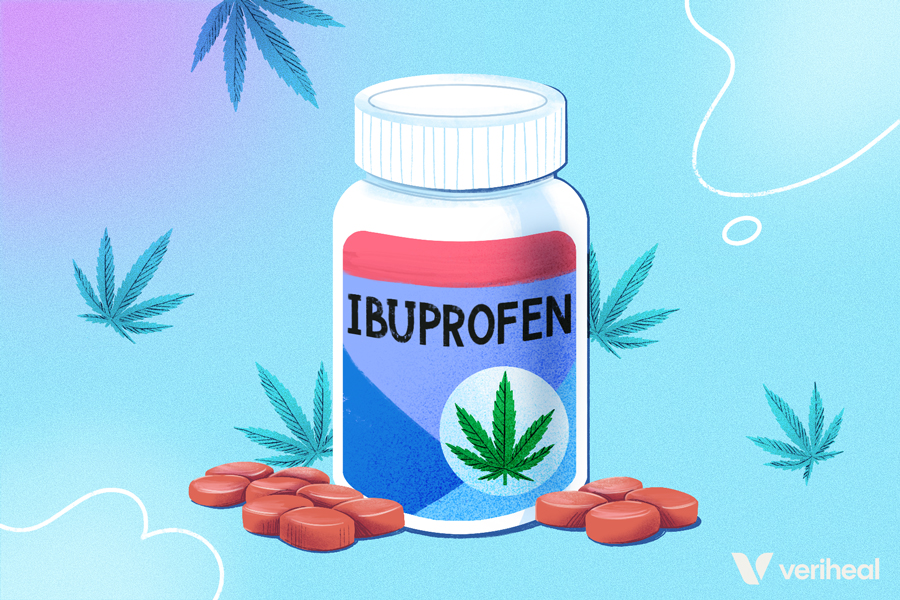Numerous scientific studies support using cannabis for pain and inflammation. For example, a noteworthy study published by the Journal of the American Medical Association (JAMA) in 2015 demonstrated that patients with chronic pain experienced a significant reduction in pain symptoms after using cannabis, highlighting its potential as a viable treatment option.
A comprehensive review of 28 studies published in JAMA in 2016 found that marijuana effectively treated chronic pain in adults, further strengthening the case for cannabis as an alternative pain management therapy. But what happens when used in conjunction with another popular anti-inflammatory like ibuprofen?
Safety facts about combining ibuprofen and marijuana are often overlooked—so today, we’ll be diving into those nitty-gritty details. Continue reading to discover essential information before incorporating both substances into your pain-relief regimen.
What Is Ibuprofen?
Ibuprofen is a nonsteroidal anti-inflammatory drug (NSAID) that works by reducing inflammation, pain, and fever in the body. It has many uses, such as treating headaches, menstrual cramps, toothaches, and even muscle aches.
Common side effects of ibuprofen include upset stomach, heartburn, and dizziness. These side effects are usually mild and can be managed by following dosage instructions and taking the medication with food or milk.
The Science Behind Using Ibuprofen and Cannabis
Ibuprofen works by inhibiting the production of prostaglandins. Prostaglandins are messengers that tell the body to react to injury or swelling. Ibuprofen blocks the activity of cyclooxygenase (COX), which exists in two forms: COX-1 and COX-2, from making these prostaglandins. By blocking both COX-1 and COX-2, ibuprofen effectively reduces inflammation, pain, and fever.
Marijuana acts explicitly on the endocannabinoid system (ECS), which helps regulate pain perception, inflammation, and stress response. The ECS consists of two primary receptors: cannabinoid receptor type 1 (CB1) and cannabinoid receptor type 2 (CB2).
CB1 Receptors and Pain Response
CB1 receptors are predominantly found in the brain and central nervous system (CNS). They play a significant role in modulating pain signals by inhibiting the release of neurotransmitters involved in pain transmission. Activation of CB1 receptors can lead to pain relief, especially for neuropathic pain, by reducing the excitability of neurons responsible for transmitting pain signals. The psychoactive effects of cannabis, primarily attributed to the compound tetrahydrocannabinol (THC), are also mediated through the activation of CB1 receptors.
Apply For Your Medical Marijuana Card Today
-
Veriheal has satisfied hundreds of thousands of patients nationwide - Get approved or your money back
- Appointments available on-demand
- Customer support available 24/7
CB2 Receptors and Pain Response
CB2 receptors are mainly expressed in immune cells and peripheral tissues, playing a crucial role in regulating inflammation and immune response. Activation of CB2 receptors can help reduce inflammation and pain, especially in conditions with an inflammatory component, such as arthritis or inflammatory bowel disease. Cannabidiol (CBD) is known to have a higher affinity for CB2 receptors, which may explain its anti-inflammatory and analgesic properties without the psychoactive effects typically associated with THC.
Both CB1 and CB2 receptors are involved in pain management through different mechanisms. CB1 receptors are primarily responsible for modulating pain signals in the CNS, while CB2 receptors help regulate inflammation and immune response, contributing to pain relief. Interestingly, CBD has been shown to target the same enzymes as ibuprofen, COX-1, and COX-2. By targeting COX-1 and COX-2, CBD effectively inhibits the production of prostaglandins, resulting in reduced inflammation and pain. This shared mechanism of action with ibuprofen highlights the promise of CBD as a natural alternative for pain relief, particularly for individuals seeking non-pharmaceutical options to manage their discomfort. By combining the prostaglandin-eliminating effects of ibuprofen with cannabis, the unique combination may offer synergistic effects, potentially enhancing the overall pain relief experienced by users.
Potential Risks Associated With Mixing Ibuprofen and Cannabis
No reported risks or serious adverse effects are associated with using ibuprofen and cannabis together. However, long-term ibuprofen use can pose several potential dangers. Prolonged consumption may increase the risk of gastrointestinal issues, such as ulcers or bleeding, and contribute to kidney damage or liver injury. Furthermore, studies have linked extended NSAID use to an elevated heart attack and stroke risk. To minimize these risks, following your healthcare provider’s guidance and taking the lowest effective dose for the shortest possible duration is essential.
In a Nutshell
Combining ibuprofen and cannabis offers a powerful force in pain management. By working in tandem, they may offer an innovative approach to finding relief and greater peace of mind. Although side effects and interactions are important to consider, the advantages make combining ibuprofen and cannabis an option worth exploring. If you want further guidance on how this treatment could benefit you or access medicinal marijuana, connect with Veriheal today to apply for your MMJ card.
Note: The content on this page is for informational purposes only and is not intended to be professional medical advice. Always consult a physician before making any decision on the treatment of a medical condition.
FAQs
Can cannabis and ibuprofen be used together?
Yes, cannabis and ibuprofen can be used together. There are no reported risks or serious adverse effects associated with combining these two substances.
How does ibuprofen work?
Ibuprofen works by inhibiting the production of prostaglandins, which are messengers that tell the body to react to injury or swelling. By blocking the activity of cyclooxygenase (COX), ibuprofen effectively reduces inflammation, pain, and fever.
How does cannabis work for pain relief?
Cannabis acts on the endocannabinoid system (ECS), specifically the CB1 and CB2 receptors. CB1 receptors are primarily responsible for modulating pain signals in the central nervous system, while CB2 receptors help regulate inflammation and immune response. Cannabis, particularly CBD, targets these receptors, offering pain relief and anti-inflammatory effects.
What are the potential risks of long-term ibuprofen use?
Prolonged ibuprofen use can increase the risk of gastrointestinal issues, kidney damage, liver injury, and elevated heart attack and stroke risk. It is important to follow healthcare providers’ guidance and take the lowest effective dose for the shortest possible duration to minimize these risks.


